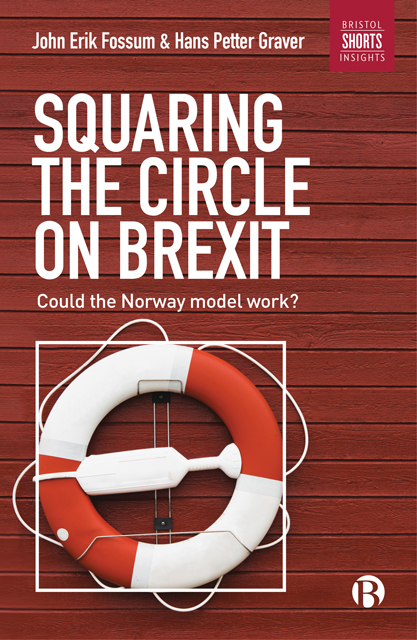Book contents
- Frontmatter
- Contents
- Foreword
- Preface and acknowledgements
- List of abbreviations
- Introduction
- 1 What does Britain want from Brexit?
- 2 Forms of affiliation with non-members
- 3 What is the Norway model?
- 4 The challenge of sovereignty
- 5 What can Britain learn from Norway’s experience?
- 6 Would Britain be an ‘elephant in the boat’?
- Conclusion
- Notes
- References
- Appendix
- Index
Preface and acknowledgements
Published online by Cambridge University Press: 21 April 2023
- Frontmatter
- Contents
- Foreword
- Preface and acknowledgements
- List of abbreviations
- Introduction
- 1 What does Britain want from Brexit?
- 2 Forms of affiliation with non-members
- 3 What is the Norway model?
- 4 The challenge of sovereignty
- 5 What can Britain learn from Norway’s experience?
- 6 Would Britain be an ‘elephant in the boat’?
- Conclusion
- Notes
- References
- Appendix
- Index
Summary
To most citizens and analysts alike, the UK referendum decision on 23 June 2016 to leave the European Union came as a shock. And even if the UK referendum debate was rather introverted, the Brexit decision has given rise to a broad debate not only in the UK but across Europe. It still remains unclear what future relationship the UK will have with the rest of Europe. Provided Brexit ensues, it has become ever more apparent that the effects will be significant. We in Norway have suddenly discovered that our relationship with the EU through the EEA Agreement and a host of other arrangements has entered centre stage in the UK debate, epitomised by the so-called Norway model. This form of association is lauded and dismissed as a possible solution for the UK. There is, however, no discussion of the implications for Norway and the other EEA states of the UK adopting this model, even if the effects on these states will be very significant. In this book we provide an overview of the Norway model, and an assessment of the likelihood that the UK will adopt (parts of or all of) this model. As part of that we discern some lessons from Norway’s experience with this type of EU affiliation, a brief discussion of the transferability of these lessons to the UK, and some reflections on the possible effects on Norway. The book combines law and politics and their vantage points for analysing the complex and composite nature of the phenomena involved. As we were preparing the book, Rosa Greaves organised a seminar in Glasgow which enabled us to discuss some of the ideas and findings of the book with a range of experts. We are very grateful for this. We are also grateful for comments and suggestions on the entire manuscript from Chris Lord, an anonymous reader at Bristol University Press and the proposal reviewers. We would like to thank our institutions at the University of Oslo for support, especially ARENA for excellent editorial assistance by Ragnhild Grønning and Jorunn Kristina Skodje. We also thank the Institute of Advanced Study at Durham University which generously hosted Graver for the university term following the Brexit vote. Finally, we are very grateful to Stephen Wenham at BUP for his enthusiastic support.
- Type
- Chapter
- Information
- Squaring the Circle on BrexitCould the Norway Model Work?, pp. vii - viiiPublisher: Bristol University PressPrint publication year: 2018



